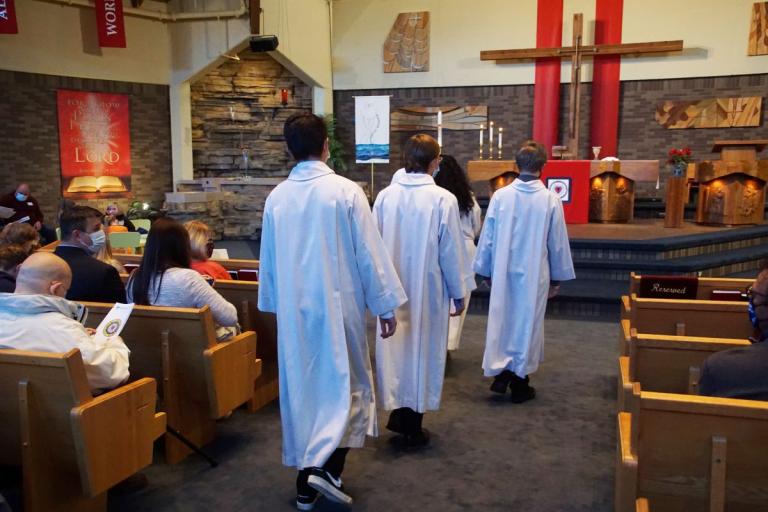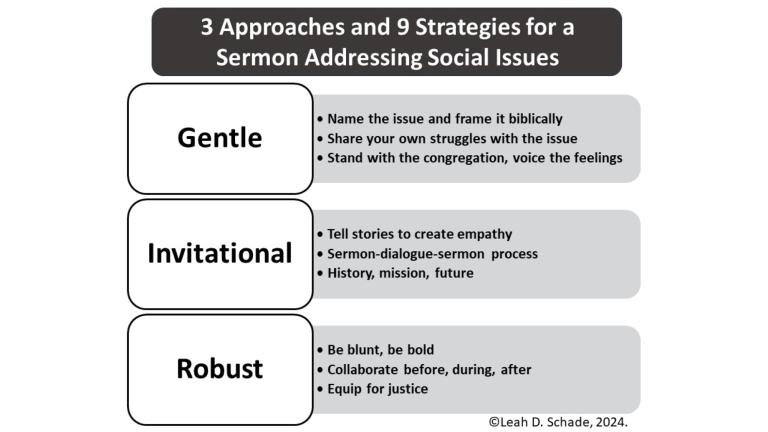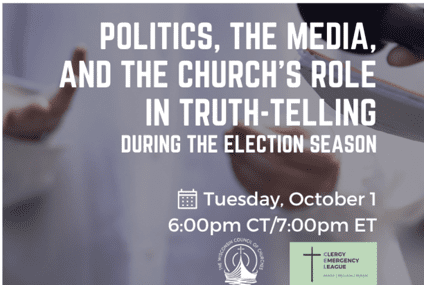John 8:31-36 is the Gospel reading for Reformation Sunday on Oct. 27, just two Sundays before Election Day. Here are election season sermon ideas using Gentle, Invitational, and Robust approaches.

[If you’re preaching instead on Mark 10:46-52, see this article: https://www.patheos.com/blogs/ecopreacher/2024/10/election-season-sermon-ideas-for-mark-10-46-52-oct-27/]
[Did you miss the sermon ideas for Oct. 20? Click here!]
Before we examine John 8:31-36 and how it might shape a sermon during the election season, I want to explain that preachers can address issues related to the election.
Preachers are free to discuss the themes and issues relevant to an election – as long as they refrain from endorsing specific candidates. In fact, many congregants appreciate when their ministers offer biblical, theological, and ethical insight on social issues that impact their lives, families, and communities.
In this article, I explained the do’s and don’ts of what clergy and congregations can say and actions they can take when it comes to politics.
Keep in mind that the biblical writers spoke to the social and political issues of their time because God is concerned with the well-being of all people. This means that it’s not only permissible for preachers to discuss the election, but it is also their moral and ethical duty to relate the Bible and theology to the issues that are relevant today, particularly as people prepare to exercise their right to vote.
But HOW a preacher talks about the election in their sermon also matters.
I developed an Assessment Tool for preaching and social issues which you can take here. This 5-minute online tool will help you think about your approaches to preaching and social issues using a three-dimensional questionnaire that measures: (1) your own vulnerabilities and strengths, (2) the characteristics of the congregation you serve, and (3) the quality of relationships within the congregation and between the congregation and yourself.
Gentle, Invitational, and Robust Approaches
Based on your score from the Assessment Tool, you’ll see that I suggest three approaches to a sermon addressing a social issue: Gentle, Invitational, and Robust. This is a framework I developed for my book Preaching and Social Issues: Tools and Tactics for Empowering Your Prophetic Voice to help ministers choose which path works best for them and their context.
- The Gentle approach is for clergy who are in situations where there may be personal or congregational stress, the congregation is new to sermons addressing social issues, or there is vulnerability on the part of the preacher.
- The Invitational approach is recommended for congregations that are ready for a more challenging message by way of dialogue and building bridges of listening, empathy, and understanding.
- The Robust approach is for clergy and congregations who are ready to be fully engaged in public theology and to put their faith into action on social issues.
I suggest three strategies for each, for a total of nine in all. You can read about these approaches in more detail in my book. In the meantime, here’s a graphic with a quick summary:

For this installment on preaching during the election season, we’ll look at the Gospel reading for Reformation. I’ll begin with a brief exegetical summary of the passage and suggest connections to election issues. Then I’ll offer Gentle, Invitational, and Robust sermon ideas that you can use in your preaching context.
Oct. 27, 2024: Reformation Sunday: John 8:31-36
Exegetical summary
John 8:31-36 takes place within a larger dialogue between the religious leaders and Jesus. After defending a woman caught in adultery (John 8:2-11), Jesus engages the leaders in a lengthy public discussion about his identity as one sent by God.
In this debate, some in the crowd come to believe in him (John 8:30). It is to them that Jesus proclaims some of his most famous words: “If you continue in my word, you are truly my disciples; and you will know the truth, and the truth will make you free” (John 8:31). When his listeners counter that have never been slaves, Jesus explains that their sin is what imprisons them.
As Lutherans celebrate their heritage on Reformation Sunday John 8:31-36 speaks to several important themes in Lutheran theology.
One is the Doctrine of Justification by Faith. Martin Luther countered the notion that God’s grace was earned through works prescribed by the church, arguing that believers are set free by their faith in Christ.
Another was the doctrine of Sola Scriptura which asserts the authority of Scripture over that of any human authority. Jesus insisted that his teachings were grounded in God’s truth and thus had liberative power.
A third is the theme of spiritual freedom. In the confession at the beginning of worship, Lutherans confess that humanity is in bondage to sin and cannot free themselves. John 8:36 reminds us that only Christ, through his death and resurrection, brings true freedom.
Each of these themes has important implications for Christians as they exercise their right to vote in this election season.
Connections to election issues
During this election season, we must ask: what is the role of truth in politics and faith? Additionally, given the media’s role in shaping public opinion during the election season, how can the church be wise stewards of truth?
This is a time when clergy as especially challenged in the tasks of preaching, teaching, and pastoral care given the preponderance of misinformation and propaganda that are shaping the opinions of parishioners. John 8:31-36 provides guidance for navigating complex social and political landscapes while maintaining a commitment to integrity and Christ-centered teaching.
Earlier this month, the Wisconsin Council of Churches and the Clergy Emergency League hosted a panel discussion called “Politics, the Media, and the Church’s Role in Truth-Telling”. Rev. Robert Franek, Rev. Nelson Rabell González, and Rev. Dr. Jim Antal discussed biblical, theological, and practical approaches for helping clergy and congregations ground themselves in integrity. You can watch the session here on your own or with members of your congregation to discuss how Christian freedom, truth, and discipleship that are central to Lutheran theology, especially when engaging in the public square.

Gentle approach: Stand with the congregation, voice the feelings.
While people may find themselves aligned with different political ideologies, we can generally agree that a core value we share is truthfulness. Or, at least, telling the truth should be a core value, since both the commandment against falsehoods and Jesus’s teaching in John 8:31-36 name truth as essential to faith.
A Gentle sermon about the need for truth during the election season and beyond can begin by highlighting the value of trustworthiness in a society. When we trust each other, what are we able to accomplish together? By the same token, what breaks down in society when there is no trust? How do people feel when they don’t believe that their leaders or sources of information are telling the truth?
Granted, the complexities of why people succumb to lies and readily accept the distortion of reality are too much to address in a single sermon. So, the goal of this sermon would simply be to assert that lying is not what God wants for us. The preacher would draw on both John 8:31-36 and Luther’s doctrines to assert that the church must be on the side of truth. The sermon could conclude with a prophetic vision of what our communities might look like when truth and trustworthiness are restored. Jesus invites us into that vision in order to build the Beloved Community.
Invitational approach: Sermon-Dialogue-Sermon process.
In the sermon-dialogue-sermon process, the first sermon would identify the problem of mistrust in American politics that is exacerbated by divisiveness and outrage. When we don’t trust each other, we don’t have the capacity to address urgent problems in our community and society. Thus, we are imprisoned by the sin of untruthfulness and are in need of Jesus’s teachings in John 8:31-36.
The preacher could then invite the congregation to a deliberative dialogue on restoring trust in our society using the National Issues Forum Institute’s nonpartisan issue guide, “A House Divided: What Would We Have to Give Up to Get the Political System We Want?” The dialogue could occur following the sermon that day or during the week. The group would discuss the guide’s options: 1) reduce dangerous, toxic talk; 2) Make fairer rules for politics and follow them; 3) Take control and make decisions closer to home.
Then the minister could preach a follow-up sermon on one of the subsequent weeks after the election drawing on the insights from the discussion and reflecting biblically and theologically on the implications for how Christians can engage the political system that affects all of our lives.
Robust approach: Collaborate before, during, after.
For this strategy, the preacher works collaboratively with members of a congregation on the sermon process. The preacher gathers a group of individuals who covenant with each other to listen deeply to lived experiences of those impacted by the issue, think critically about the challenges of addressing the issue, and work creatively to craft a collaborative sermon that engages the congregation.
In a sermon on John 8:31-36, the preacher and collaborators would root their message in John’s premise that there is an important standard God uses to judge political leadership. How much do they tell the truth and build both internal and external structures of accountability and trust?
The group could explore different ways to activate moral and theological responses as we approach our national election and beyond. Watch the video on “Politics, the Media, and the Church’s Role in Truth-Telling” and ask: how often do our elected officials tell the truth? When they do not tell the truth, what are the outcomes? In what ways do their words reflect their character? Most importantly, who is hurt when they don’t tell the truth?
To be clear, the sermon would not draw conclusions about what candidates Christians should support. Rather, the preacher would share what the group had discerned about the church’s role in truth-telling during this election and beyond.
Following the sermon, the group can host a feedback session to listen to what the congregation heard, how they felt, what they learned, and what they might do in response moving forward.
Bottom line – Speak and listen with the truth of Jesus
Whether pursuing the Gentle, Invitational, or Robust approach, every preacher can encourage their listeners to vote. By electing leaders who are aligned with the intention telling the truth, we influence policies, budgets, and laws at the local, state, and national level. Elected officials have the power to shape people’s reality in either helpful or hurtful ways. Preachers can encourage their listeners to vote with John 8:31-36 in mind so we can know the truth and the truth can make us free.
May God bless your discernment, dialogue, preaching, and ministry during this election season!
Stay tuned for sermon helps for Nov. 3!
Read also:
Election Season Sermon Ideas for Mark 10:35-45, Oct. 20
What Clergy Can Say (and Not Say) During the Election Season
Post-Election Messaging: Preaching: Red, Blue & Purple Church Tactics

The Rev. Dr. Leah D. Schade is the Associate Professor of Preaching and Worship at Lexington Theological Seminary in Kentucky and ordained in the ELCA. Dr. Schade does not speak for LTS or the ELCA; her opinions are her own. She is the author of Preaching and Social Issues: Tools and Tactics for Empowering Your Prophetic Voice (Rowman & Littlefield, 2024), Preaching in the Purple Zone: Ministry in the Red-Blue Divide (Rowman & Littlefield, 2019) and Creation-Crisis Preaching: Ecology, Theology, and the Pulpit (Chalice Press, 2015). She is the co-editor of Rooted and Rising: Voices of Courage in a Time of Climate Crisis (Rowman & Littlefield, 2019). Her book, Introduction to Preaching: Scripture, Theology, and Sermon Preparation, was co-authored with Jerry L. Sumney and Emily Askew (Rowman & Littlefield, 2023).













